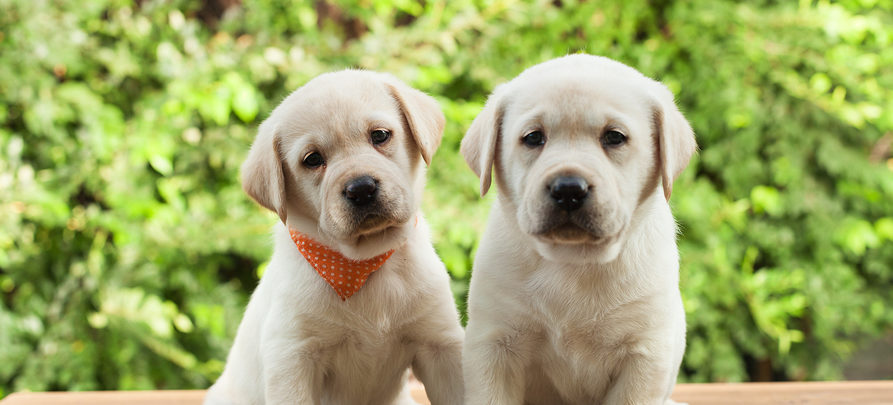Looking at that cute little puppy face, you can’t imagine loving him more than you do right now and you certainly can’t imagine loving him less! But raising a puppy can be hard work. The “new” wears off fast after several nights of waking at 3 A.M. to let the puppy out, or cleaning up soiled rugs or worse, losing a pair of good shoes to those damaging puppy teeth.
Here’s the good news: If you can let the power of the cute balance out the hassles, those early months will fly by. It can help to think of the hard work that first year as an investment that will pay off over the next 10-15 years of life with your best friend.
Regardless of the specific joys and challenges you face with your puppy, you will never go wrong if you keep a few basic rules in mind.
First, praise the puppy every chance you get! For example, every time you see your puppy chewing on his own toy or a bone, tell him he is a good dog. Every time your puppy walks up to you and sits down, tell him he is a good dog. Every time he eliminates in the grass, tell him he is a good dog. Make a pro-puppy fashion statement and wear a treat pouch whenever you’re together, giving him a tiny little tidbit of a treat at the same time you praise him. This really reinforces to the puppy that he has done something you like.
Just as important, you want to avoid punishing y our puppy in any way for things that he does wrong. This means not yelling at him or even saying “No!”. Remember, puppies have no concept of right or wrong. They only do what feels good for them. They will repeat the behaviors that get rewarded. Punishing them can be confusing, frightening, and anxiety-provoking, all of which are emotional states that interfere with your puppy’s important task of learning.
Even worse, punishment can severely damage your bond with your puppy. Imagine if you were a foreigner in a strange land and you were yelled at every time you tried to greet someone by shaking their hand. You’d be very puzzled at first, and eventually you might be scared of these strange and unfriendly people who didn’t want to shake your hand. In fact, they would respond to your attempt to greet them by shoving their face into yours, which confused and scared you even more. You might conclude these people were hostile or at least incomprehensibly odd!
But what if they simply belonged to a culture in which people greeted each other by rubbing noses or bumping foreheads? You not only didn’t speak their language, you had completely different cultural expectations and habits. Imagine if someone had, instead of ignoring you or slapping your hand away or acting as if you were behaving strangely, tried gently to demonstrate how they say “hello” in this unfamiliar place!
That’s the situation with your puppy. He has expectations formed by his experiences up until the day you met him, and they may well be at odds with the ins and outs of living in his new family. It’s up to you to set up to succeed by placing him in situations where he can perform the right behaviors, then to praise him often and avoid punishment.
A second important rule to remember is to never force your puppy into a situation where he’s demonstrating fear. This is more likely to make a fear worse not better. If your puppy is already showing fear of things that he sees or experience on a regular basis, you should reach out to your veterinarian and see if working with a positive, qualified trainer or seeing a veterinary behaviorist is a good idea.
Also consider placing an Adaptil collar on him during this socialization period. Adaptil Junior, a collar made just for puppies, is impregnated with dog appeasing pheromone, a pheromone that mother dogs produce during the time that they are nursing their puppies. It has been shown to have a calming effect and decrease some of the signs associated with fear and anxiety.1,2,3
You may also want to consider a puppy socialization class. A puppy socialization class can help teach your puppy how to cope with the novelty that he may experience as a part of his daily life. Adaptil Junior has also been shown to help puppies attending a socialization class develop with less of the fear and anxiety associated with poorly socialized puppies.4,5,6
For a lifetime of joy with your puppy, put in the time and effort now!
References
- Gaultier E, Bonnafous L, Bougrat L, et al. Comparison of the efficacy of a synthetic dog appeasing pheromone with clomipramine for the treatment of separation-related disorders in dogs. Vet Rec 2005;156: 533-538.
- Mills DS, Ramos D, Esteller MG, et al. A triple blind placebo controlled investigation into the assessment of the effect of Dof Appeasing Pheromone (DAP) on anxiety related behaviour of problem dogs in the veterinary clinic. AABS 2006;98:114-126.
- Pageat P, Gaultier E. Current research in canine and feline pheromones. Vet Clin North Am Small Anim Pract 2003: 33;187-211.
- Gaultier E, Bonnafous L, Vienet-Lague, et al. Efficacy of dog-appeasing pheromones in reducing stress associated with social isolation in newly adopted puppies. Vet Rec 2008;163:73-80.
- Gaultier E, Bonnafous L, Vienet-Lague, et al. Efficacy of dog appeasing pheromones in reducing behavours associated with fear of unfamiliar people and new surroundings in newly adopted puppies. Vet Rec 2009;164:708-714.
- Denenberg S, Landsberg GM. Effects of dog appeasing pheromone on anxiety and fear in puppies during training and on long term socialization. JAVMA 2008: 233;12.

This article was reviewed/edited by board-certified veterinary behaviorist Dr. Kenneth Martin and/or veterinary technician specialist in behavior Debbie Martin, LVT.








